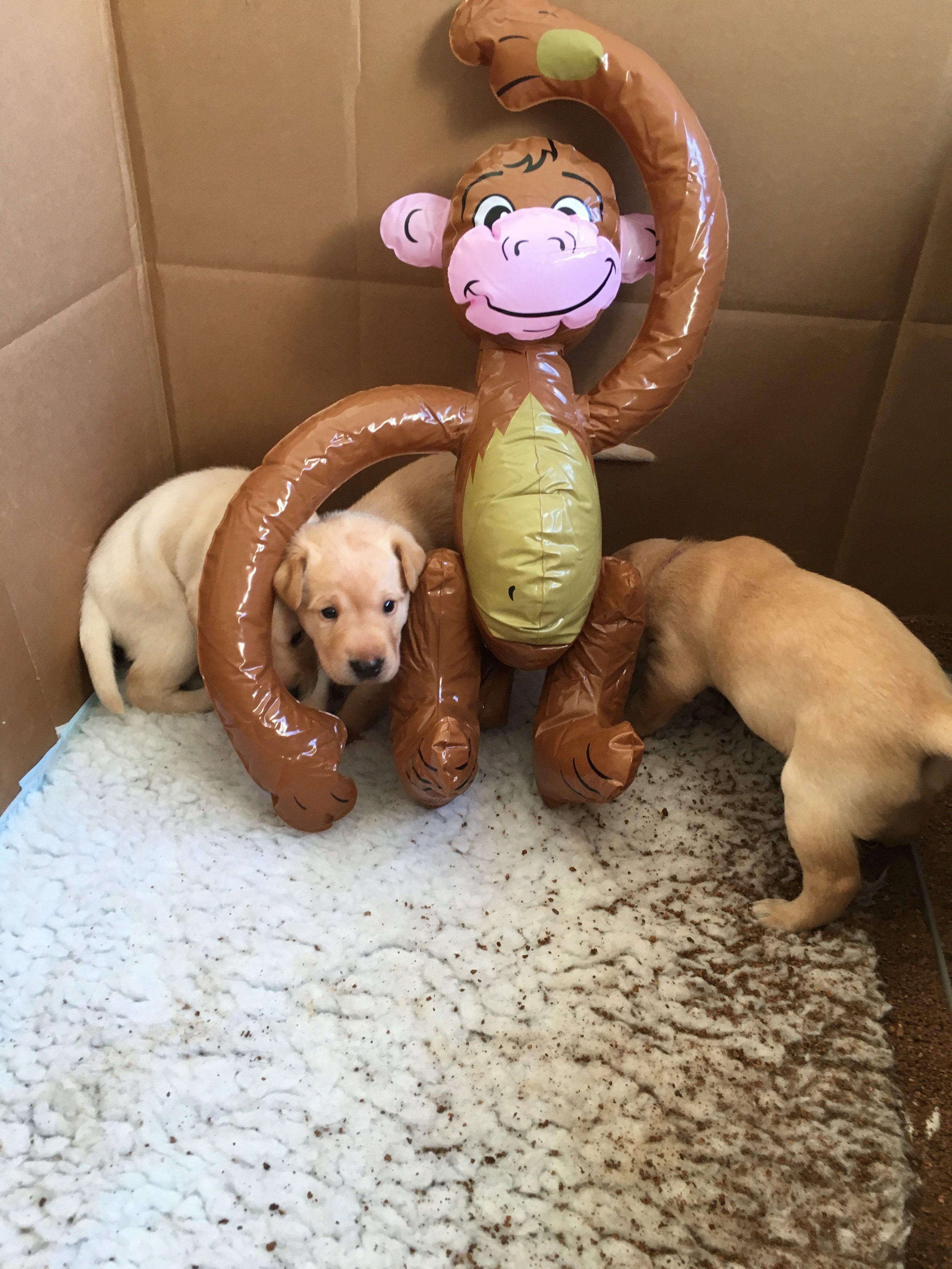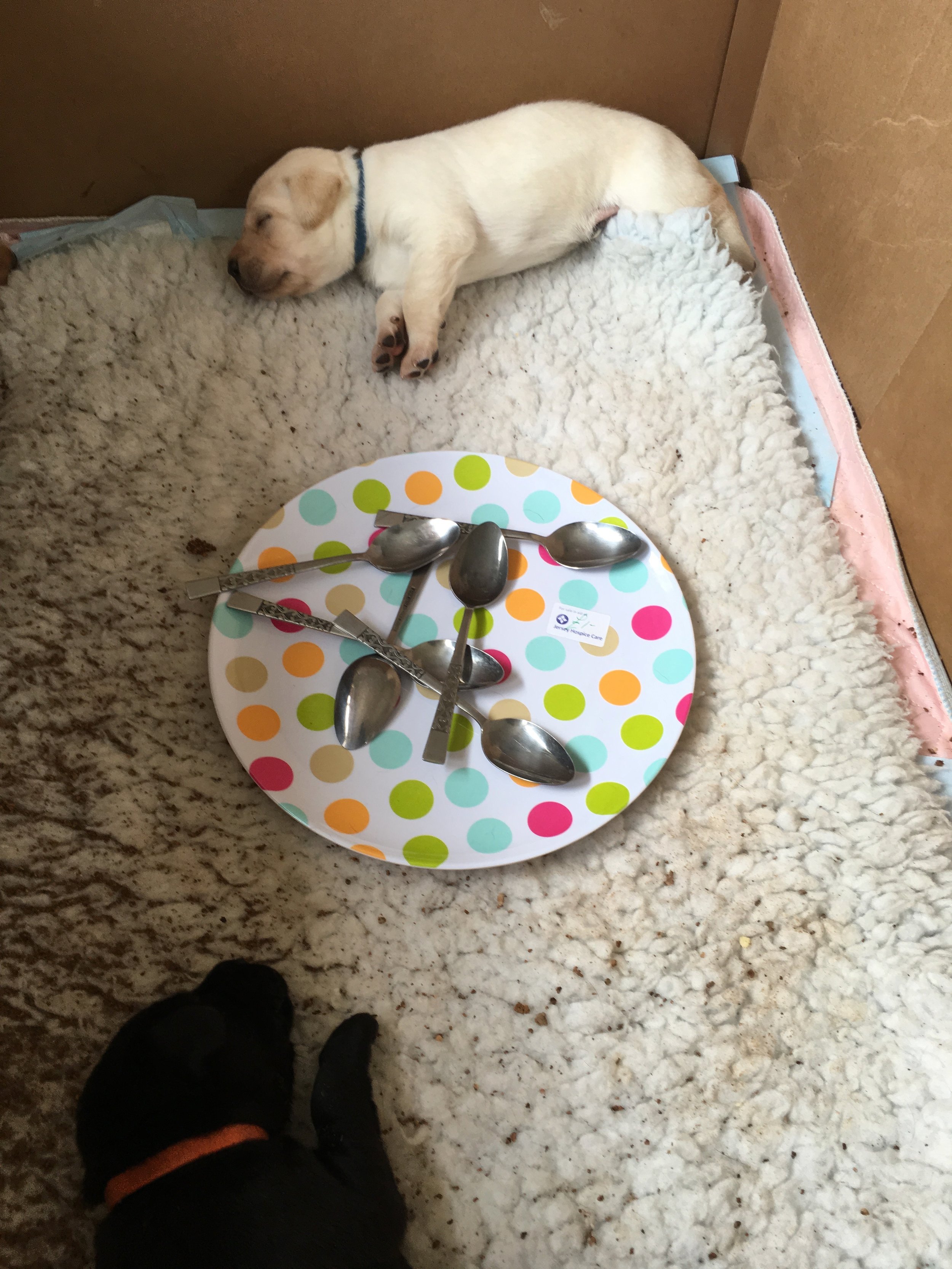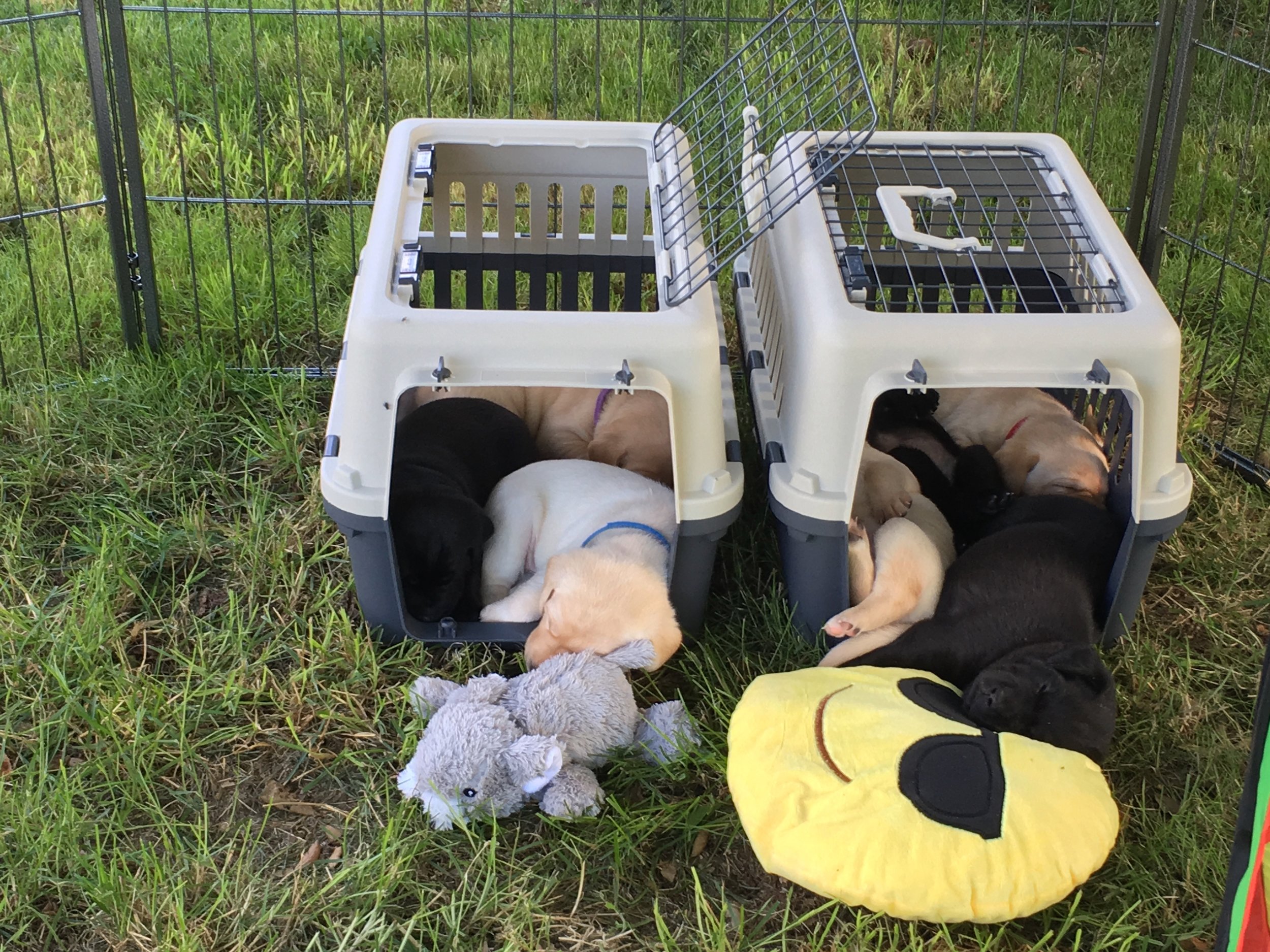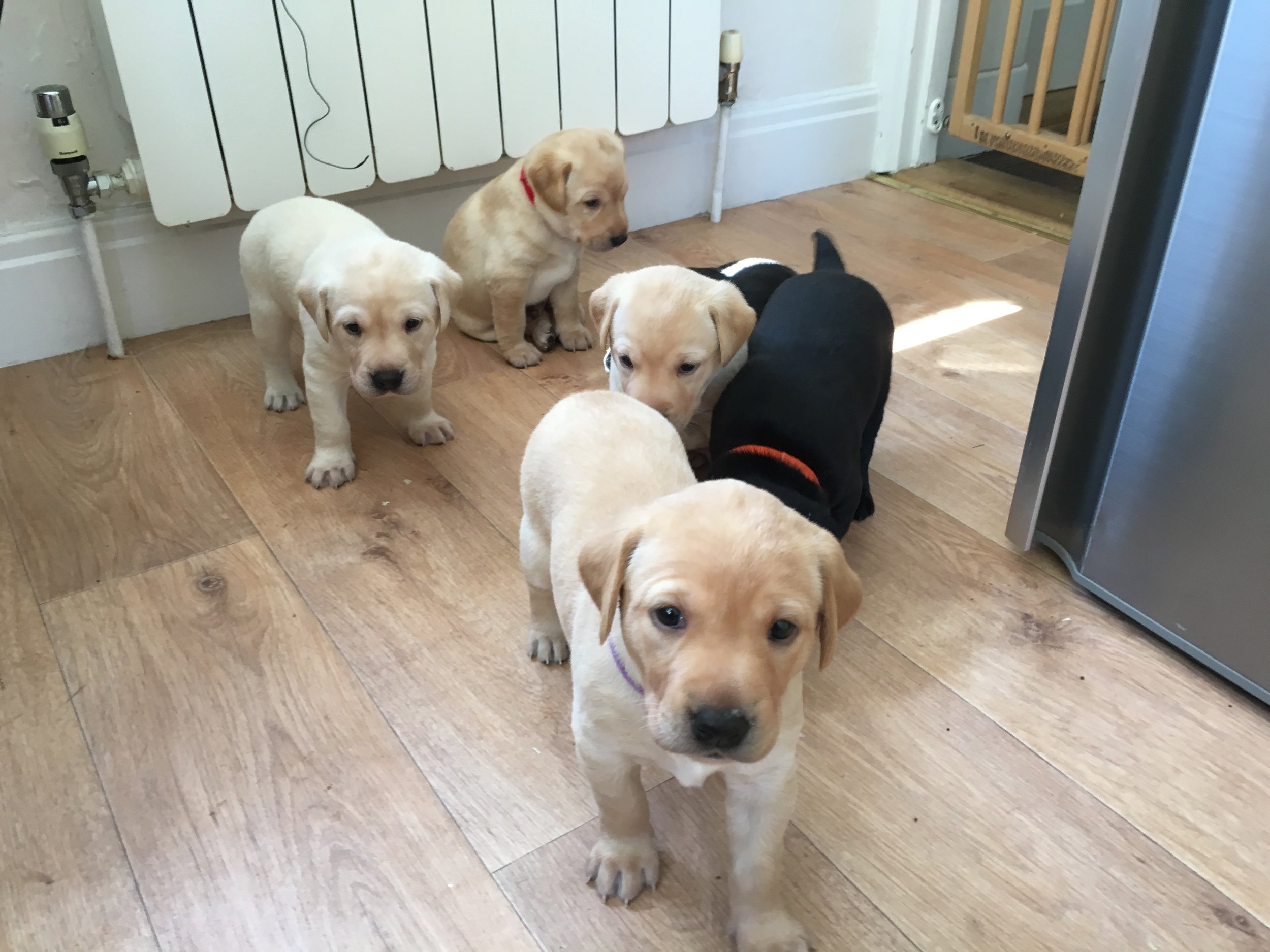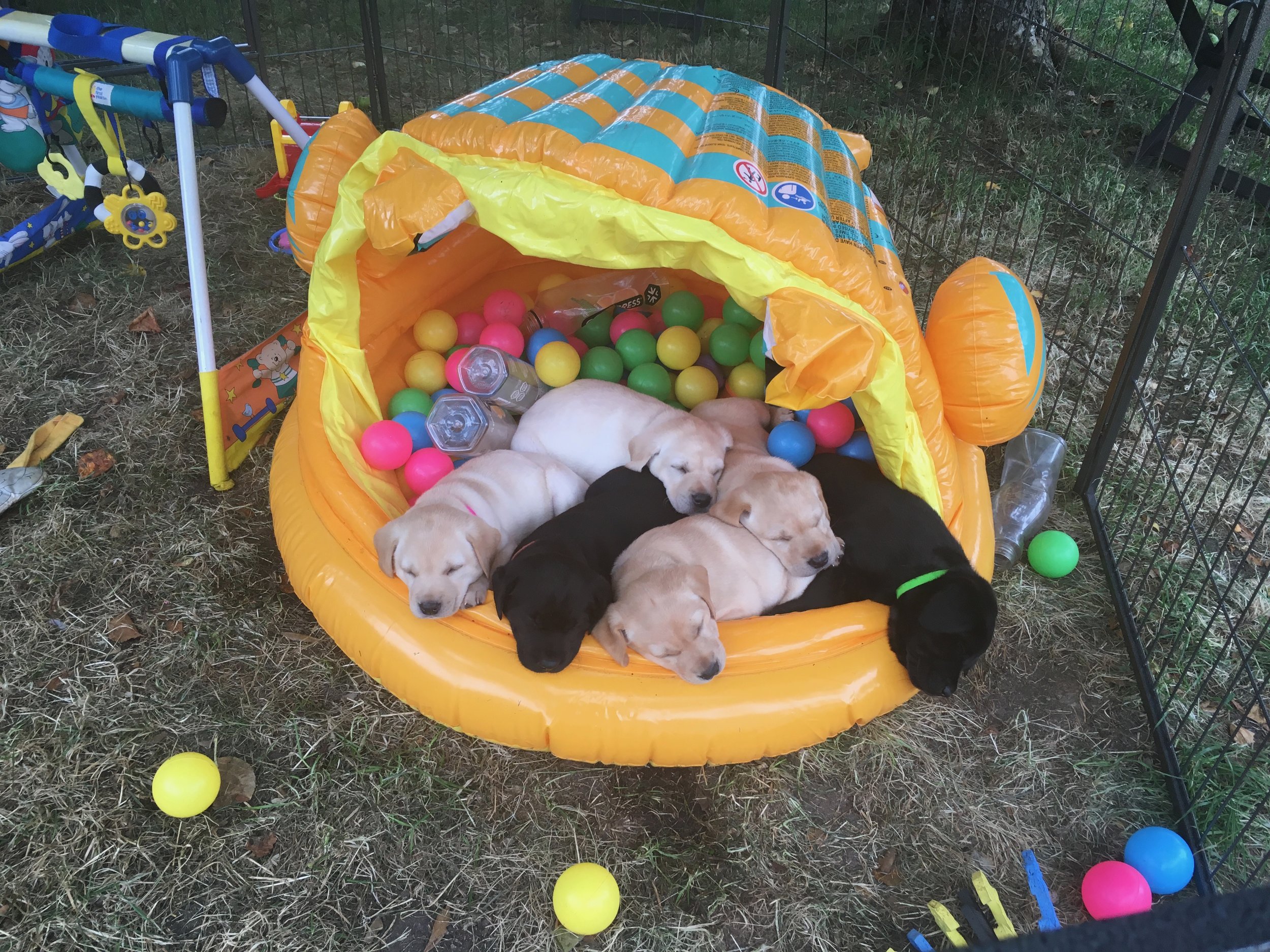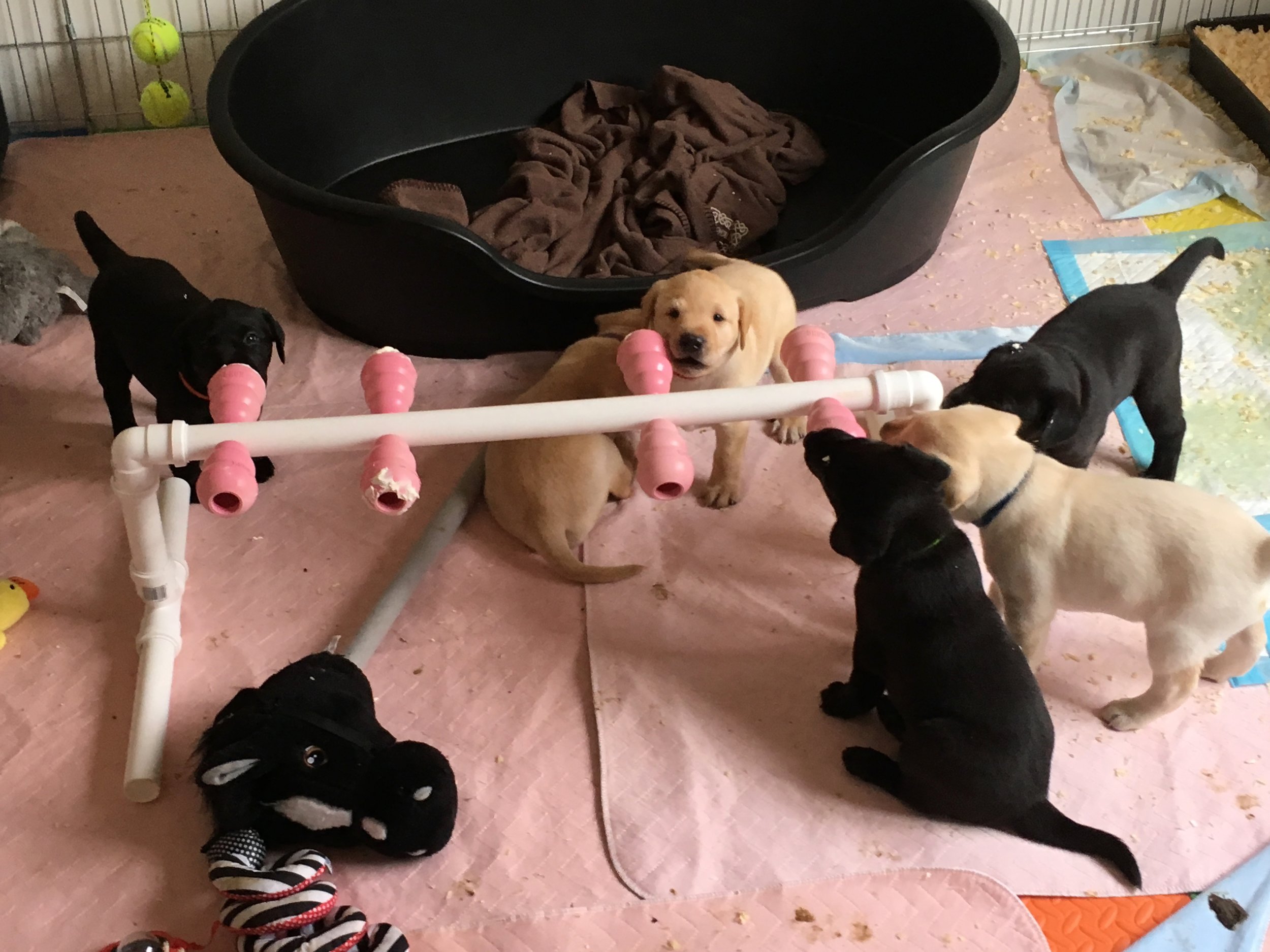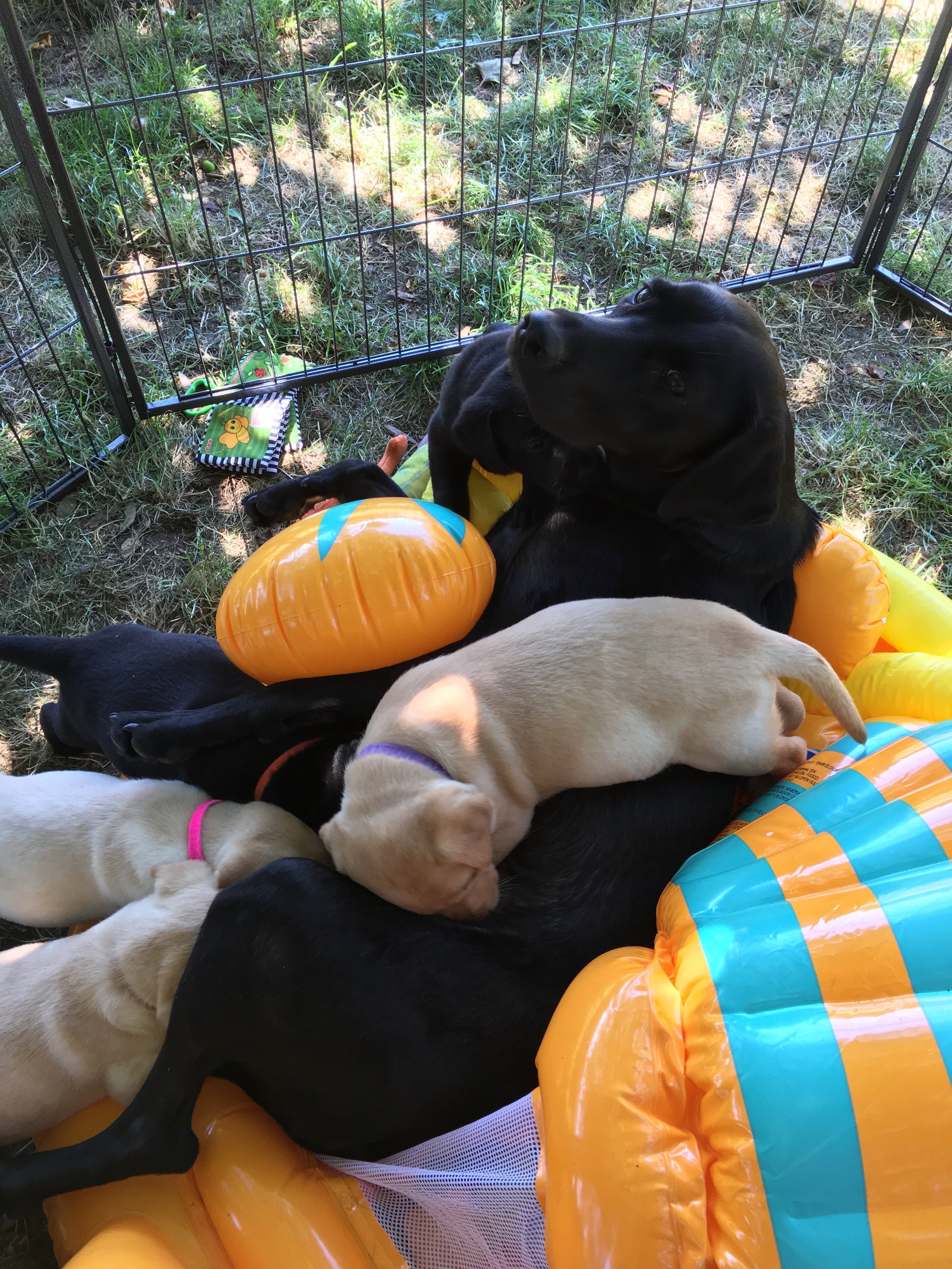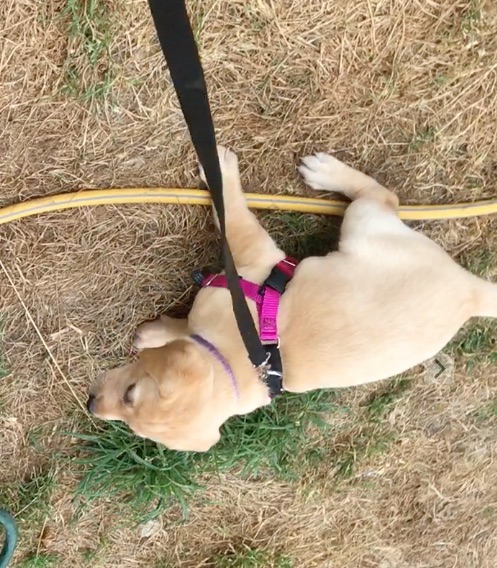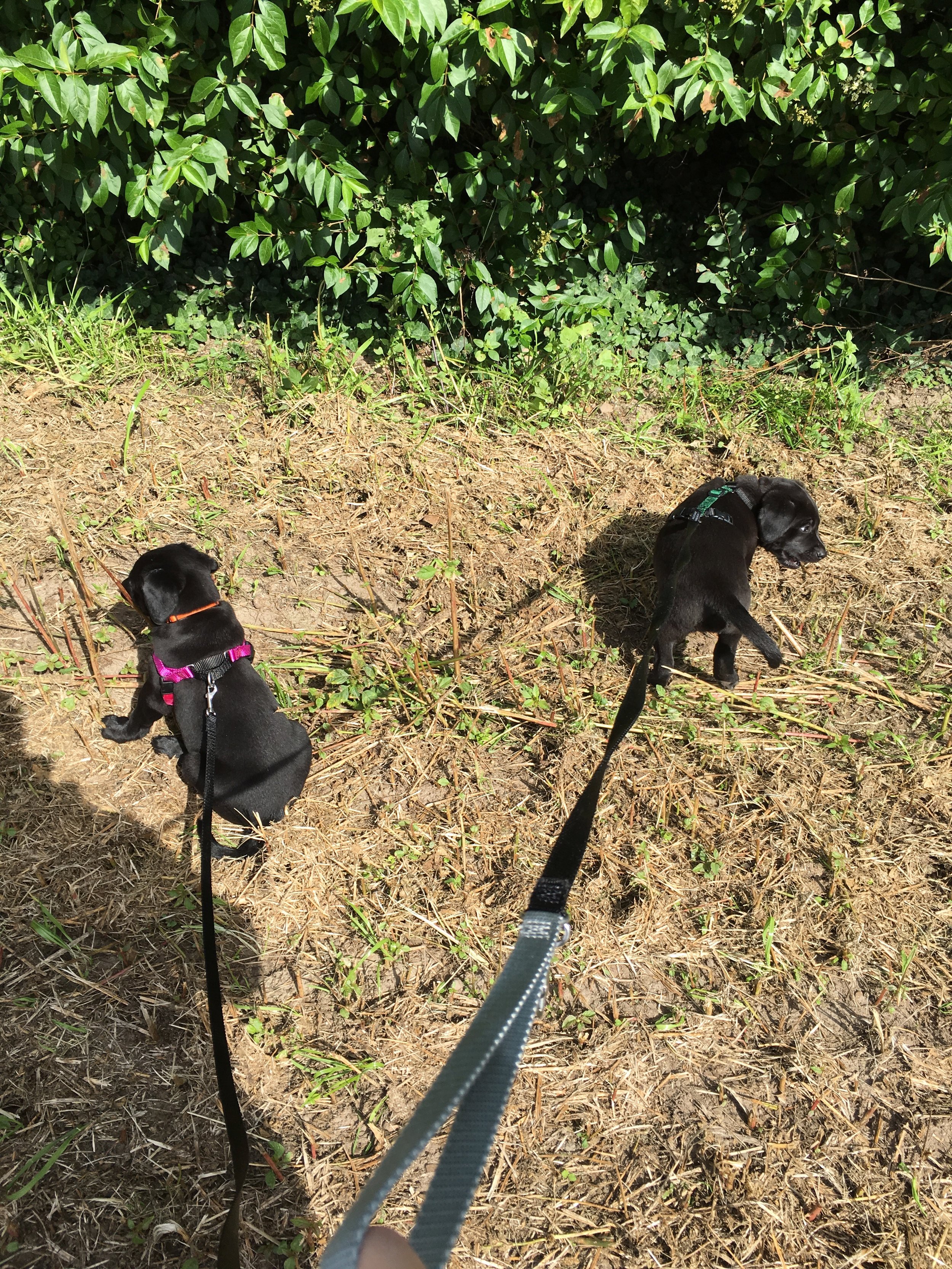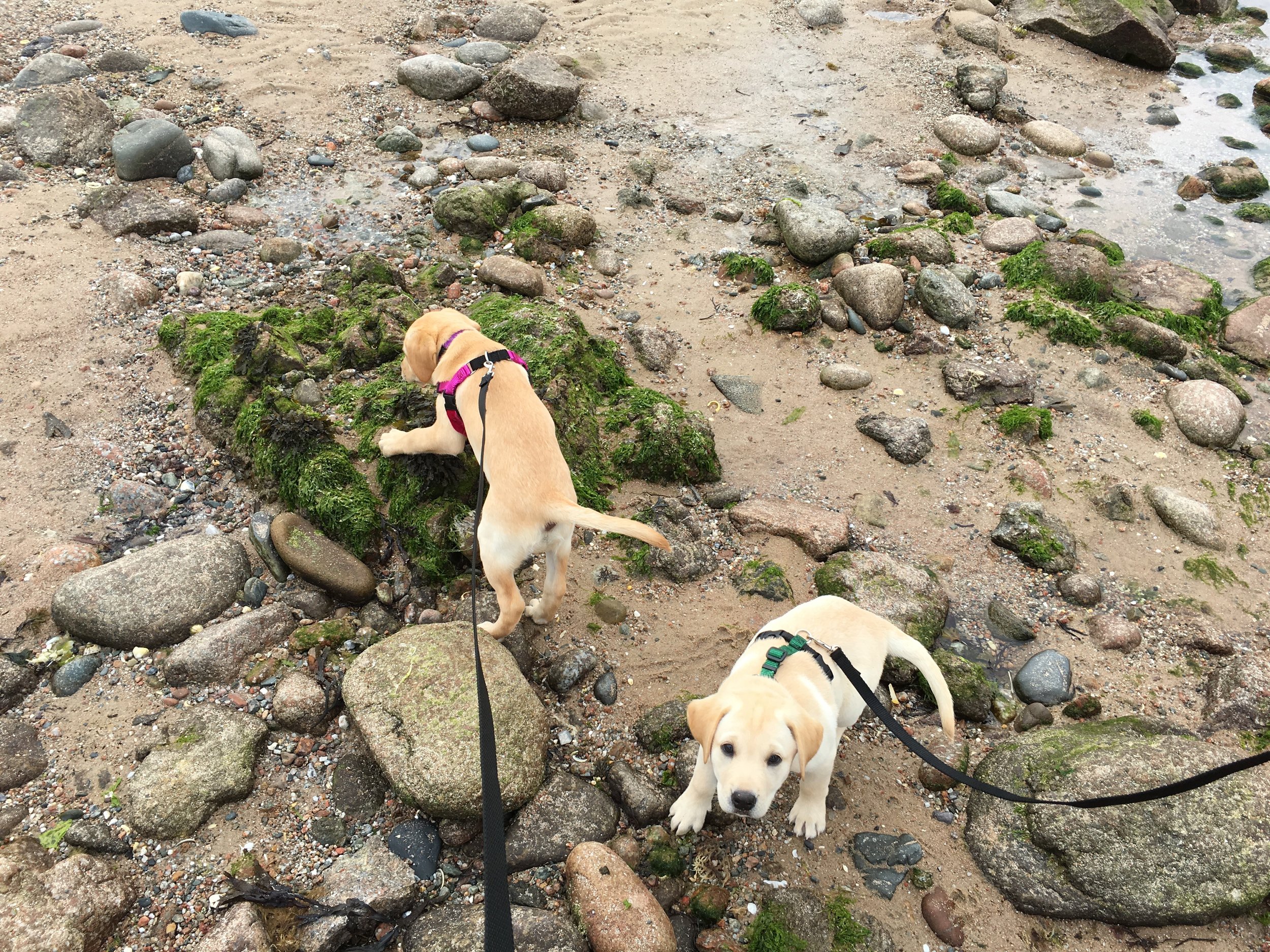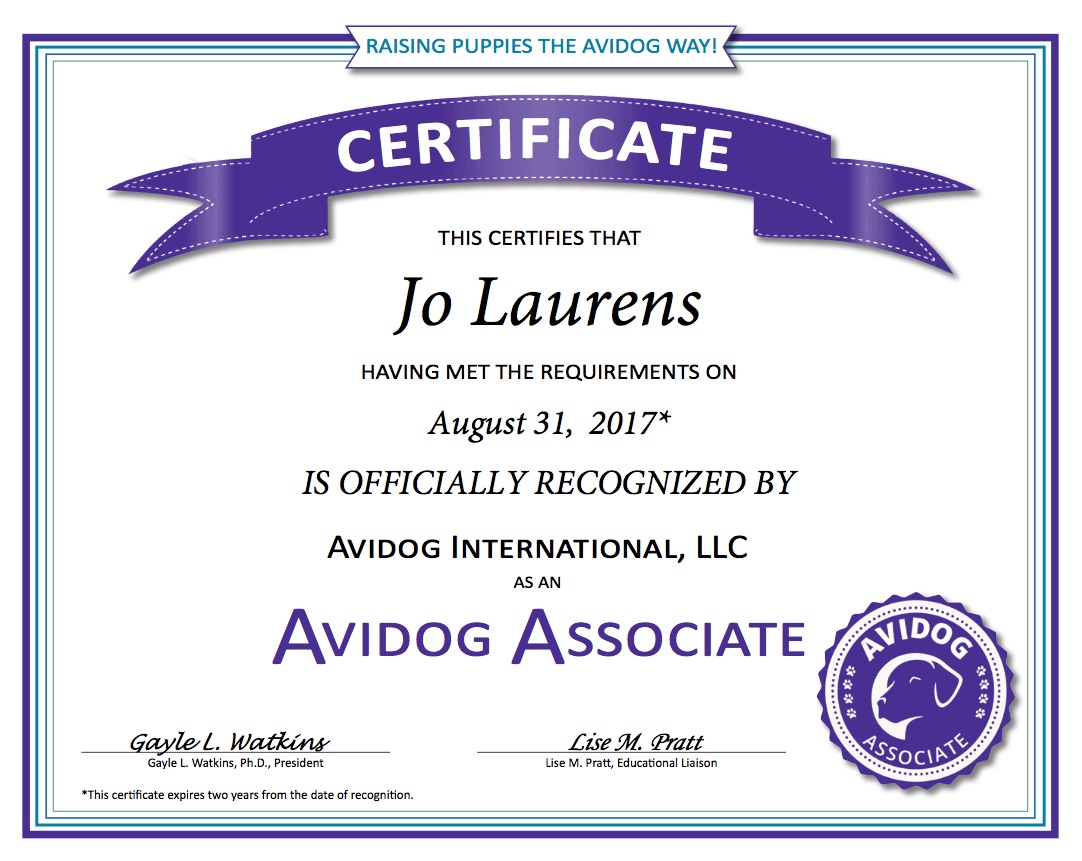Puppy Culture & Avidog
We are listed on the Puppy Culture breeders’ map and we are also Avidog Associate Breeders.
Puppy Culture is a puppy-raising programme for breeders, created by Jane Killion.
Avidog offers a comprehensive programme, starting before pregnancy and includes optimal nutrition and an Early Scent Introduction programme.
To get a better idea of what's involved, take a look at these videos:
ENS is a prescribed series of exercises which each puppy goes through, every day, from Days 3-16, for 3-5 seconds each time.
Early scent Introduction
ESI is an Avidog concept. It exposes the puppy to one novel non-food scent each day, from Days 3-16, for 5 seconds each time. This stimulates the development of the nose and scenting abilities.
For more information on ESI, check out this link.
We used to do Early Neonatal Stimulation (ENS) as well - but we no longer do this, due to concerns that it may overstimulate developing brains and predispose them to stress instead of inoculating them against it. Instead, we handle and smooch the puppies daily!
puppies raised in the house
Many breeders will whelp litters in the house, but then move them to outside kennels once the pups reach 3-4 weeks and begin making noise and mess.
Unfortunately, this coincides with when the socialisation period starts - and when the pups need, more than ever before, to be in the middle of a busy household.
Our litters are whelped and raised in the house.
In this photo, you can see a camp bed next to the whelping box in our kitchen. One of us sleeps by the puppies for 3 weeks - just to make sure no one gets squished by accident!
Early toilet-training
When the puppies' eyes open around 3wks, and they start to toddle around, a toilet area is added to the whelping box.
This greatly speeds up toilet-training for new owners, since puppies don't get used to going everywhere and to sleeping in their pee/poop.
We use puppy pee pads at this age. Half the whelping box is a sleeping/play area, and the other half is a toilet area.
A new object, daily
As soon as the puppies' eyes have opened, a new object is introduced to the whelping box, daily.
The puppies explore this novel object keenly. We try to vary the objects so they have different textures, sounds, smells and sizes.
In the photos below, you'll see some of the early experiences the puppies had with new objects, in the whelping box.
Weaning - the recall whistle
We are huge advocates of feeding a raw complete. Puppies are weaned to a complete raw. There are many great brands these days!
From this age, and throughout the time they are with us, they will hear 5 pips on an Acme 212 gundog whistle before we put down their food - at every meal.
At first, this noise means nothing to them. But, by the time they are 7-8wks, they will have a very enthusiastic response to hearing their recall whistle.
This means that our pups go to their new homes with a trained whistle recall.
We also give our new owners an Acme 212 whistle, so they can keep up the good work. (If you prefer to use another pitch, the pups seem to transfer across, no problem.)
You can see the result of our recall training, in a video below!
The weaning pen
At the age of about 4wks, the pups are getting too big and too busy for the whelping box. They are moved to the larger weaning pen, still inside our house.
You can see the toilet area. The rest of the pen is covered with washable hospital incontinence pads.
The pups have lots of toys and equipment to play with. They continue to have a new object, daily. We also introduce crates at this age.
Environmental enrichment
This video gives an idea of the enriching environment we aim to achieve.
The pups have toys hanging overhead (mobiles); tunnels to climb through; a wobble board which moves under their feet (to get used to uneven surfaces - great for pups which will go on to be agility dogs); crinkly plastic as their 'new object' and much more.
The barrier challenge
The Barrier Challenge starts at 4wks, and we repeat it daily with each puppy until they are having no problems navigating the barrier.
The pup is given a little taste of the food, then moved away a short distance behind a barrier.
They must figure out a way around the barrier, to reach the food. This activity greatly enhances problem-solving and intelligence, as well as developing the capacity to think when frustrated.
Outdoor enclosure
From the age of 5wks, the pups also start spending time daily in an outdoor enclosure.
It's half the space in this photo to begin with, and then enlarged as the pups grow.
This gives us more space for play equipment, adds to the socialisation experiences for the pups and also gives them room to chase and run.
It also means we can properly clean out the indoor pen, ready for the evening when they return inside.
Clicker training a default sit
A 'default sit' is a 'sit-to-say-please'. When the dog wants something, they 'ask' for it by sitting, rather than jumping at it.
Pups are also learning the important lesson that their behaviour has consequences which they can control. This concept leads to biddable and trainable dogs!
Group default sits
After starting the puppies off individually, we can train them in a group. We feed each sitting pup, and ignore any jumping pups.
This results in huddles of puppies, sitting when people approach the pen - instead of jumping up.
The default sit is really about developing the concept of self-control in a very young puppy. The best way to get what you want (later - birds!) is not always to try to get it - but instead to control yourself.
Novel objects & challenges
We challenge the puppies with new play equipment daily.
This video shows them, at 6wks, exploring an inflatable toy which we made into a ball-pit.
We observe the puppies as individuals and note how they approach challenges and tasks.
Car tripS at 6-7wks
Many pups have a long journey ahead of them when they go to new homes.
We ensure they are used to the crate and have experienced car travel before being collected.
In this photo, Ms Orange, Mr Blue and Ms Purple are all ready to take a trip to a local cafe for 30mins.
We don't put puppies down on the ground in public places, or allow them to meet strange dogs. We do hold them in our arms, carry them, and allow people to meet them.
We also allow them to explore on the ground on our own land using the Avidog concept of 'Adventure Walks'.
trips away from the house - 100 people
We take the litter out at least weekly from 5wks, to pubs and cafés, for 30mins each visit.
Pups stay on our laps or arms and do not go down on the floor.
We get quite a lot of attention when we are out and about with pups and we aim to meet 100 people before pups leave the litter.
Trained whistle recall at 7wks
As shown above, we begin whistle recall training when we begin weaning the puppies - by peeping the whistle at every meal time.
This video shows the result of that training, at 7wks.
All our puppies will go to new homes, with a whistle recall response and an Acme whistle.
Puppy Aptitude testing
We test our puppies at around 7.5wks at the earliest. The later we can test, the better.
Future litters will be assessed with the Avidog Puppy Aptitude Test. This test helps us assess a puppy's temperament and confidence.
For puppies intended for working homes, we look for traits like independence versus dependence - and natural retrieving ability.
We use these assessments and our own observations throughout the development of the puppy, to place each puppy in the right home.
We don’t allow new owners to choose a puppy because we have watched the pups grow and develop throughout their lives. Owners choosing will only have a snapshot of the pups for the short time they are viewing them.
We have much more information on each individual puppy and can ensure we will give you the best pup for your needs. This way, there is also no ‘first-come, first-served’ - your puppy is there for you, whenever you come to collect him or her.
The Puppy Party at 7wks
The Puppy Culture protocol involves a 'puppy party', held around the age of 6-8wks. This provides a huge dollop of socialisation with new people; a new location; and training.
Our parties are held on a disinfected hall floor, with everyone wearing shoe protectors. Thanks to my advanced students for their help and training expertise.
We have ‘stations' around the room, each working with the puppies on different tasks: An agility tunnel; two wobble-boards; the default sit; shaping targeting on a lid; and following a lure!
Staying on past 8wks
Sometimes pups need to stay with us past 8wks. This might happen if homes are abroad - or if a new home can’t take their pup at 8wks.
Fortunately the Puppy Culture programme runs right up to 16wks - and we just keep right on with it.
Pups will be vaccinated according to their age and travel needs, introduced to birds, socialised and trained with 1-2-1 attention.
It is hard to summarise the extensive work we do with pups before they leave us.
Scent Circles and intro to Tracking (from Puppy Culture)
Manding/default sit (from Puppy Culture)
Stacking - or the Stand, for obedience or the ‘whoa’ (from Puppy Culture)
Fold-Back Downs
Attention is the Mother of All Behaviours (from Puppy Culture)
Resource Guarding prevention (objects, locations, food-guarding prevention)
The Box Game (shaping exercise) (from Puppy Culture)
And lots and lots of socialisation
The goal is not to produce puppies who can do it all at 8wks - but puppies that know how to learn with you, work with you, train and respond to you. So that you can keep their focus and attention in the field.



